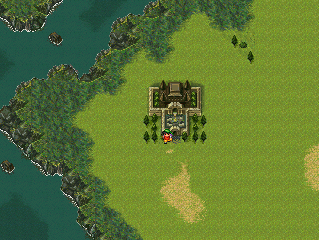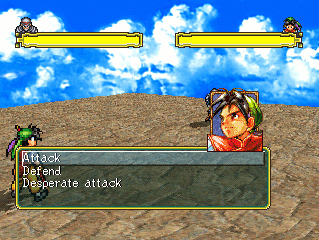So are strategic battles kind of like RTS gameplay?
Retro Game of the Week: Suikoden
|
|
On 06/06/2015 at 11:20 AM by The Last Ninja See More From This User » |

A game composed of humble sprites that rise to exceed expectations
RPGs were all the rage during the 16-bit days. You could find plenty of them on all the sytems of the time. This carried over to an even greater extent when the Sony Playstation came along; due to CD storage capacity, RPGs could now be long and exciting adventures. One such early RPG on the PS1 was Suikoden, developed and published by Konami, and released in 1996. Many suspect that this game was planned as a late SNES RPG, but was pushed back to the PS1 once they realized it would be more ideal for their game. Whatever the case, Suikoden certainly set itself apart from other RPGs of the time.
The story is very political in nature: you play as the son of the famous Teo McDohl, General of the Imperial Army. You quickly discover that the Imperial Army is corrupt, and in an instant, young McDohl and his comardes become fugitives. They join the Liberation Army, the rebel group which wants to defeat the Imperial Army. When the leader is killed, young McDohl becomes the new leader, traveling and recruiting those who will join in the fight against the Empire. The story and characters are perhaps the strongest part of the game.

The graphics are sprite-based, with characters and towns that would almost look right at home on the SNES. However, magic spell effects and a 3D-ish battle perspective will remind you that you're playing a PS1 game. The characters are taller than what we're used to seeing on the SNES, giving them more realistic proportions. Dialogue between characters is great, many times allowing us to get a glimpse at different personalities. The main protagonist (who you must name) is a silent one, but many times throughout the game you'll get to choose between two decisions, but the decision you make never matters. This irritates me. Why give us the choice if it doesn't matter what we choose? Downplaying choices really makes them feel unnecessary.
You can have up to six characters in your party, which is great. Here Suikoden sets itself apart from other RPGs of the time: the game has a whopping 108 characters! This means that you're constantly finding and recruiting new characters throughout the whole game. It sounds like overkill, but Suikoden uses all of these characters in unique ways. Not all of them can fight in battle; some will go to the Liberation Army headquarters (an abandoned castle which your group took over) and help you in a specific field (such as a blacksmith, shop keeper, appraiser, inn keeper, etc.). You'll want as many people as you can get in order to help with strategic battles (I'll get to those in a moment).

The battle system in Suikoden is also a little different from your typical turn-based RPG. First off, each character has a specific weapon; instead of buying new weapons for characters, you will need to sharpen them at a blacksmith so that they become stronger. Runes can be attached to weapons or used as magic spells. Some characters will already have Runes when you get them, and the Rune attacks can be very powerful. In battle, you can choose to fight, run, bribe the enemy (which may cost you a lot of money), or simply choose "free will," which has the characters fight automatically (saves a lot of time). Battles move quickly, especially since enemies and characters alike will fight at the same time; two fighters will run up and attack two different enemies, and enemies may also attack in pairs. Some characters can also do unite attacks, where two specific fighters attack together, doing major damage. Healing itmes (such as medicine) are still used even after the enemies are defeated, which I really appreciate. In short, the battle system is great. After a battle, experience points are applied to each character; some get more than others if they are behind in their level, which keeps everything balanced.

While the battles are good, there is a minor flaw here. For some reason, some characters cannot fight unless a comrade dies or they get very low on HP. I noticed that one particular character started out this way, and later in the game was able to fight as usual, but I'm not sure why they did this. However, the characters who cannot fight often have Runes which allow them to perform special attacks, so in no way does this ruin the game. It's simply a small thing that bothered me.
A few hours into the game you'll take over the Castle of Toran and name it whatever you like. This becomes the main hub for the Liberation Army. It's neat to see it expand more and more as the game progresses. You'll return here to be briefed on missions and talk to the characters. Eventually all shops will be established here, run by people which you recruited. One man you recruit says he's an inventor and that his invention is called an "elevator;" after recruiting him, you return to the castle to find out that he installed an elevator so you don't have to take the stairs (there are five floors). The castle really feels like home.

On the world map, you can walk around and enter towns or take a ride in your boat. At first you can't really go anywhere in the boat, but over time the boat will be upgraded so you can go over obstacles and enter new areas. This brings us to the biggest problem in Suikoden: the game is very linear. The game is good about telling you where to go next, but should you attempt to enter another town, something or someone will stop you from getting in. It's a little ridiculous. About 12 hours into the game you finally have a little freedom to enter several different towns, but it's still limited in what you can do. However, due to the linearity, the game progresses quickly.
Suikoden's narrative is rife with political intrigue, betrayals, and sacrifices. More than once an enemy which you were fighting decides to join you after realizing how evil the Empire truly is. One of your closest friends chooses to sacrifice himself in order to save you from deadly spores, which is easily the game's most touching scene. At the same time, Suikoden has plenty of fantasy elements, including magic spells, elves, dwarves, and mythical runes. All of these elements come together to make Suikoden's story a fantasy political thriller, which is quite unique.

The boss battles in Suikoden are a weak point; usually you fight a dragon that just blows fire at you, which is boring. However, the game makes up for this with two other kinds of battles. First are the stategic battles, which are large-scale battles that involve all of the characters you have recruited thus far; these are reminiscient of the strategy battles in the Fire Emblem games. Tiny fighters will fill the battlefield, the stats for the opposing army at the top left and the stats for your army (Liberation Army) at the top right. You choose a group of fighters to attack, such as "Commander's Team" or "Forest Protectors" (the elves), but you can also choose the Stategists or the Engineers, which can boost attack power or try to turn the enemy traitor. If you're not careful, a character will be killed in battle, and you'll permanently lose them in the game. These battles can be difficult, but are certainly fun to watch and make you feel like a real commander when you win.
The other kind of battles in the game are the tough 1-on-1 battles. In these battles, you'll face-off against one challenging opponent. You get only three choices: Attack, Defend, or Desperate Attack (the opponent has the same choices). These are nail-biters! Sometimes your attack may miss or the enemy will perform a desperate attack and chop down your life dramatically. These are the real boss battles of Suikoden.

Final Verdict--4 Stars: Recommended
Despite some minor flaws, Suikoden really stands out as a great RPG. The game is not long (15-20 hours), which means that they packed A LOT into one game. Tons of characters, fast battles, awesome stategy battles, intense 1-on-1 battles, and a great story all come together to make this a fantastic game that is still fun to play. The Playstation has plenty of sprite-based RPGs, but none quite like this one. The fast progression of the story keeps you hooked; you'll want to find out what happens next. Konami did a great job in crafting a unique game that distinguishes itself from all the other RPGs of its day.
Join me every Saturday as we take a look back at all kinds of retro games, good and bad.



Comments